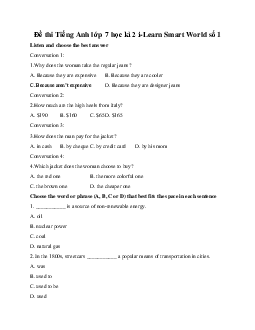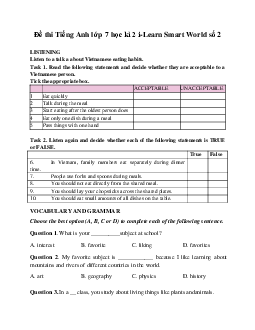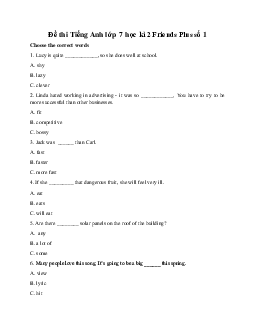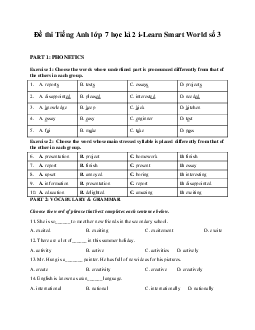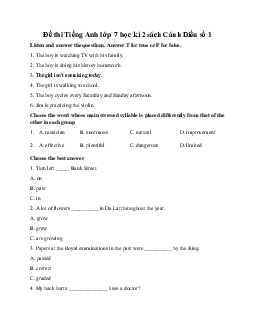








Preview text:
TRƯỜNG THCS ……………….
ĐỀ CƯƠNG ÔN TẬP CUỐI HỌC KÌ II MÔN TIẾNG ANH LỚP 7 NĂM HỌC 2022-2023 A. Vocabulary
- Từ vựng unit 9, 10, 11, 12 B. Grammar
1. Thì hiện tại đơn
2. Thì quá khứ đơn ( Past Simple) a. Cách dùng:
- Diễn tả một hành động xảy ra trong quá khứ, chấm dứt trong quá khứ không liên
quan đến hiện tại. Thì qkđ diễn tả những hành động mang tính chất kể lại.
b. Từ nhận biết của thì quá khứ đơn. - yesterday (hôm qua)
- last night/week/month/. . (Tối qua/tuần trước/tháng trước. )
- ago (cách đây), (two hours ago: cách đây 2 giờ/ two weeks ago: cách đây 2 ngày. .)
- in + thời gian trong quá khứ (e.g: in 1990) - when: khi (trong câu kể) c. Mẫu câu:
* Đối với động từ thường + Khẳng định
S + v +ed/ v ( bất quy tắc qk)
- Động từ có qui tắc : V-ed Eg : - work worked - clean cleaned * Notes :
- Những động từ một âm tiết, tận cùng là một phụ âm trước nó là một nguyên âm
duy nhất , ta gấp đôi phụ âm cuối rồi thêm đuôi "ed). Eg : -stop stopped - drop dropped
- Những động từ kết thúc là "y" trước y là một phụ âm , ta đổi y thành i rồi thêm ed Eg : - study - studied
- Những động từ kết thúc là nguyên âm + y, biến đổi bình thường. Eg: - play - played
- Những động từ kết thúc là e chỉ thêm d : Eg : - arrive arrived *Cách đọc đuôi ed :
- Đuôi ed được đọc là /id/ khi đứng sau t và d : Eg : wanted needed
- Đuôi ed được đọc là / t / khi đứng sau F, k, p, sh, ch, ss, x,ce
Eg : - stopped, washed, watched, missed, fixed, cooked . .
- Đuôi ed được đọc là d sau các trường hợp còn lại: lived, played… +.Phủ định : S + didn't + V I did not live in Ha Noi + Nghi vấn : Did + S + V ?
+ có từ để hỏi: wh + did + s + v…?
* Đối với to be: thì/ là ở + Khẳng định S ( I/ He/she/it) + was…. S ( you/we/they) + were …. + phủ định S ( I/ He/she/it) + was + not S ( you/we/they) + were + not
+ nghi vấn: was / were + S +…….?
+ câu hỏi có từ để hỏi: wh + was / were + S……. ?
3. Thì tương lai đơn
Future simple (Thì tương lai đơn)
a. Usage (Cách dùng) Cách dùng Ví dụ
- The festival will take place from February 1st to 10th. Dùng để diễn tả một
hành động hay sự việc (Lễ hội sẽ diễn ra từ ngày mùng 1 đến ngày 10 tháng 2.)
sẽ xảy ra trong tương - Our band will play at the festival next month. lai
(Ban nhạc của chúng tôi sẽ chơi tại lễ hội này tháng tới.)
b. Form (Dạng thức của thì tương lai đơn) Thể khẳng định Thể phủ định I/ You/ We/ They/ I/ You/ We/ They/ Danh từ số nhiều
+ will + V nguyên mẫu Danh từ số nhiều + will not + V nguyên mẫu (will = ’ll) He/ She/ It/ He/ She/ It/ (will not = won’t) Danh từ số ít Danh từ số ít Ví dụ: Ví dụ: - I will visit Hue city. - She won’t forget him.
(Tôi sẽ đến thăm thành phố Huế.)
(Cô ấy sẽ không quên anh ấy.)
- She will be fourteen years old on her next - Hung will not go camping next week. birthday.
(Tuần tới Hùng sẽ không đi cắm trại.)
(Cô ấy sẽ 14 tuổi vào sinh nhật kế tiếp.)
- We won’t do some shopping tomorrow.
- They will come to the party next Sunday. (Chủ
nhật tuần sau họ sẽ đến bữa tiệc.)
(Ngày mai chúng tôi sẽ không đi mua sắm.) Thể nghi vấn Câu trả lời ngắn I/ You/ We/ They/ I/ You/ We/ They/ Yes, will.
Wil Danh từ số nhiều + V nguyên Danh từ số nhiều l mẫu? He/ She/ It/ He/ She/ It/ No, won’t. Danh từ số ít Danh từ số ít Ví dụ:
- Will you go to Hanoi city next month? Yes, I will./ No, I won’t.
(Tháng sau bạn sẽ đi thành phố Hà Nội à?)
- Will she meet her boyfriend tonight? (Tối nay cô ấy sẽ gặp bạn trai phải không?)
Yes, she will./ No, she won’t.
- Will they arrive here next week? (Tuần sau họ sẽ đến đây phải không?)
Yes, they will./ No, they won’t.
Dấu hiệu nhận biết
- Trong câu thì tương lai đơn thường xuất hiện các từ sau: tomorrow (ngày mai); next week/
month/ year. . (tuần/ tháng/ năm sau), some day (một ngày nào đó); soon (chẳng bao lâu),. .
- Ngoài ra các từ và cụm từ như I think, I promise, perhaps = probably (có lẽ, có thể),. . cũng
được dùng trong thì tương lai đơn.
4. Liên từ "because" : bởi vì
Ta dùng liên từ because để chỉ nguyên nhân
Because + S + V ( chia)…………………, S + V (chia)………………………….
S + V (chia)…………………………. because + S + V ( chia)…………………
Eg: Because I stayed up late, I was tired
I was tired because I stayed up late
5. Liên từ " although" mặc dù….nhưng
Although + S + V ( chia)…………………, S + V (chia)………………………….
S + V (chia)…………………………. although + S + V ( chia)…………………
Eg: Although she was tired, she went to school.
she went to school although she was tired.
6. Adjectives in order (Trật tự của tính từ)
Tính từ kích cỡ + tính từ tuổi + tính từ màu sắc + N (danh từ)
Eg: I have a big new red backpack.
7. Possessive pronouns (Đại từ sở hữu)
Đại từ sở hữu thay thế cho một tính từ sở hữu và một danh từ đã nhắc ở trước. Đại
từ sở hữu luôn đứng một mình không cần danh từ theo sau. Personal pronouns Possessive adjectives Possessive pronouns
(Đại từ nhân xưng) (Tính từ sở hữu)
(Đại từ sở hữu) I My Mine You Your Yours We Our Ours They Their Theirs He His His She Her Hers It Its Its
This is her book. That book is mine. This car is yours.
8 . Comparison of (not) as + adj + as: So sánh (không) bằng
This car is not as expensive as mine.
Trains are as comfortable as cars.
Plane tickets are not as cheap as train tickets.
9. Mạo từ a/an/the (Articles )
*Mạo từ là từ dùng trước danh từ và cho biết danh từ ấy đề cập đến một đối
tượng xác định hay không xác định
+ “A, an”: đề cập đến một đối tượng ( danh từ) chung hoặc chưa được xác
định rõ. Đối tượng lần đầu được nhắc tới mang tính chất giới thiệu.
“A” đứng trước một phụ âm.
Ex: a book (một quyển sách), a school (một ngôi trường), a university (một trường đại học),…
“An” đứng trước một nguyên âm (u,e,o,a,i) hoặc một phụ âm câm.
Ex: an ice-cream (một que kem), an English book (một quyển sách Tiếng Anh), an
orange (một quả cam), an hour (một giờ đồng hồ), …
“An” cũng đứng trước các mẫu tự đặc biệt đọc như một nguyên âm.
Ex: an SOS (một tín hiệu cấp cứu); an MC (một người dẫn chương trình),…
+ The: Ta dùng “the” khi danh từ chỉ đối tượng được cả người nói lẫn người nghe
biết rõ đối tượng nào đó (được nhắc lại), dùng cho cả danh từ đếm được (số ít
lẫn số nhiều) và danh từ không đếm được…
Ex: The truth (sự thật)/ The bicycle (một chiếc xe đạp)/ The bicycles (những chiếc xe đạp) * Lưu ý:
- Chúng ta sử dụng “the” với một số tên quốc gia: the United States of America,
the United Kingdom, the Netherlands, the Philippines, the United Arab Emirates,…
- Chúng ta sử dụng “the” với các tòa nhà, bảo tàng, khách sạn và nhà hàng nổi
tiếng: the Empire State Building, the Houses of Paliament, the Ritz Hotel, the
White House, the Louvre Museum,…
+ Không sử dụng mạo từ với tên các đường phố, công viên, hồ, bãi biển, thị xã,
thành phố, đảo và hầu hết các quốc gia.
Ex: There are a lot of department stores on Hung Vuong street.
10. The structure using “like” and “different from”
1. The comparison with “like”: Chúng ta dùng cấu trúc so sánh “like” để so
sánh sự giống và khác nhau giữa các sự vật, sự việc.
S + V + O (nếu có) + like + noun/ pronoun( danh từ/đại từ)
- Ta có thể để giới từ "like" đứng đầu câu
- Mr. Quang speaks English like a native speaker.
- We won’t join this festival like American. = Like American, We won’t join this festival
2. The comparison with “different from”: Chúng ta dùng cấu trúc so sánh
“different from” để so sánh sự giống và khác nhau giữa các sự vật, sự việc.
S + be + different from + noun/ pronoun
- This festival is different from that one.
- Your choice is different from mine. 11. But/ and /or /so
S + V (chia)………, and/ but/ or / so + S + V (chia)……
- "and": và, được dùng thêm ý
- "but": nhưng, dùng nối trái ý
- "or": hoặc/ nếu không, nối ý lựa chọn
- "so": vì vậy, chỉ kết quả
Eg: She was tired, so she stayed at home. C. Exercise
I. Choose the words whose underlined part is pronounced differently from that of the others in each group.
1. A. wallet B. pen pal C. ferry D. myself 2. A. flight B. tourist C. sightseeing D. exercise 3. A. cheesesteak B. beach C. Christmas D. change 4. A. souvenirs B. southwest C. thousand D. house 5. A. repeat B. wear C. teaching D. speaking 6. A. postcards B. photos C. chips D. islands 7. A. visited B. watched C. talked D. walked 8. A. explained B. practiced C. ordered D. named
II. Choose the word whose main stressed syllable is placed differently from that of the other in each group. 1. A. ferrry B. photo C. postcard D. arrive 2. A. hockey B. nervous C. address D. wallet 3. A. musician B. Australian C. exchange D. ticket
III. Choose the best answer to complete each sentence.
1. I was delighted because my parents__________ me a new car yesterday. A. buy B. buys C. bought D. buying
2. That exercise was very__________ I couldn’t get an A on my test. A. interesting B. suitable C. easy D.difficult
3. __________Anna__________ wash her clothes 3 days ago? A. Did-has to B. Did-have to C. Do-have to D. Does-has to
4. I’m really__________ with Nick. We have an English project, but he doesn’t do his part. A. annoyed B. excited C. hopeful D. pleased
5. Mary does not …………. the house everyday. A. clean B cleans C. is cleaning D.cleaned
6. We visited Hue city ………………October 4th, 2021. A. in B. on C. to D. at
7. He wants to buy a__________ backpack. A. new big green B. big new green C. new green big D. bigl new green
8. Many locals and__________ take the bus to visit the flower garden. A. tourism B. touring C. tours D. tourists
9. She is not__________ intelligent__________ her sister. A. as-as B. more-as C. as-than D. same-as
10. This is not your luggage. It's__________. A. herself B. her C. she D. hers
11 The government encourages people to use more public__________ to save energy. A. ticket B. transportation C. streetcar D. luggage
12. I usually walk to school, but today I__________ to school by bus. A. am going B. goes C. go D. went
13. My brother likes maths, ________________ he doesn’t like history. A. and B. but C. or D. so
14. The children forgot their homework,___________ the teacher was angry with them. A. and B. but C. or D. so
15. I prepared a new________ for my swimming lesson. A. swimsuit B. souvenir C. phone D. ferry
16. The________ is showing us around the city. A. tourist B. interviewer C. waitress D. tour guide
20. I prepared a new________ for my swimming lesson. A. swimsuit B. souvenir C. phone D. ferry
21. The________ is showing us around the city. A. tourist B. interviewer C. waitress D. tour guide
22. I saw________ London Eye when I visited________ England last month. A. a/ the B. the/ a C. a/ a D. the/ x
23. Uniforms in my school are different__________ those in my sister’s. A. for B. with C. on D. from
IV . Circle the letter A, B, C or D to indicate the underlined part that needs correcting in each
of the following questions.
1. She goed to the sports center to play football yesterday. A B C D
2. They weren't play badminton at the sports center 5 days ago. A B C D
3. This is my house and that is her. A B C D
4. We are excited about go on holiday. A B C D
V. Supply the correct forms of the given words to complete the sentences.
1. My classmates and I are fond of_______ English at school. (speak)
2. The weather here is warm and_______ and people are really friendly. (sun)
3. Unlike Linda, Peter isn’t(5) __________ at music. (well) 4. The __________are very hard-working. ( work) 5. Nowadays, we have a lot of _____________things in our society. (convenience) VI. READING
I. Complete the sentences with the words from the box. way accident clear (4) heavy drives take
For many years, Alan has been driving to work and back every weekday. Every morning, on his
(1)…………. to work, especially during the rush hour, the highways are usually crowded
causing massive traffic jams. The situation is even worse in the evening when he (2)……….
home. All the traffic comes to halt whenever there is an (3)……………or a car has broken down
and blocks an entire lane. In the winter, particularly when it snows, multi-car accidents with
injuries can take emergency paramedics and vehicles removers a number of hours to
(4)……….the road. When Alan is stuck in a ( 5)…………traffic jam, he listens to music on the
radio to calm his nerves. His boss and his wife know that if he is late, he is probably stuck a traffic.
II.Reading the fol owing passage and choose the option (A, B, C or D) that best answers
each of the questions below.
My school is the most enjoyable place for me. My school is located very near to my home. I
walk to my school every day. I like the gathering in my school for us to have a lot of fun. I love
all my teachers. They are very kind and polite in correcting our mistakes. They have never been
hard on us. So, we have always tried our best to study well and write our exams well. My school
is known for its best results in our locality. I am very proud of my school. I like my school very much.
1. What is the topic of the passage? A. My first day at school B. My best teacher at school C. What I like about my school
D. What makes my school the best
2. The author goes to school _______. A. by bike B. on foot C. by bus D. by car
3. He likes his teachers because ______.
A. they never shout at students B. They know everything
C. they correct student’s mistakes politely D. They are creative
4. They have to do their best to do the following EXCEPT ______. A. having a high result B. learning well C. doing the test well
D. helping their friends in exam
5. The word “known” in line 6 is best replaced by ______. A. common B. famous C. active D. nice
VII. Rewrite the following sentences without changing the meaning.
1. My sister is more beautiful than me.
I am not………………………………………………………………………………….
2. We are not as happy as her.
She is…………………………………………………………………………………….
3. I was tired, but I stayed up late to work.
Although………………………………………………………………………………
4. It rained, so we did not go to the theater.
Because . . . . . . . . . . . . . . . . . . . . .
5. Lan's school is Hai Ba Trung School. Hue goes to Nguyen Hue School.
Lan’s school is…………………………………………………………………………
VIII. Make meaningful sentences from the following cues
1. sister / usually / make / us / do / housework.
2.She / good / play / guitar/ future ?
3.Your classmate /usually / play badminton / sports center / Sundays ?
4. sister / help / you / homework / soon ?
5.The festival/ take / place /here/ last night.
6. We / not / want / students / be / lazy.
7. The festival / take / place / Da Lat / next year.
8. They /not/ break/ many/ bowl / last night.
9. You / buy / lot / souvenir / when you / be / England / last year ?
10. Like Hoa/ We / enjoy / go / holiday.
